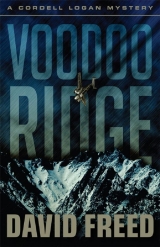
Текст книги "Voodoo Ridge"
Автор книги: David Freed
Жанр:
Триллеры
сообщить о нарушении
Текущая страница: 16 (всего у книги 17 страниц)
TWENTY-FOUR
Some say the drive between Reno and Lake Tahoe is among the prettiest in the country. Bald eagles. Gurgling, unspoiled streams. Verdant mountains majesty. All of that nature stuff at every turn of the gently winding, perfectly maintained road. I was too focused and too much in a hurry to play tourist. I needed to get back to Lake Tahoe, find Gordon Priest, and extract the truth from him by whatever means necessary.
Buddhists consider impatience and anger to be poisons that cloud sound judgment. I won’t deny that I was well beyond both. The baser parts of my brain were running the show, the “fight or flee” parts, and I wasn’t about to flee. Should I have contacted Deputy Streeter to tell him what I’d learned in Reno, then backed off and let law enforcement do its job? A prudent man would’ve done exactly that. But prudence was the last thing on my mind. I craved revenge, cold and sweet, and I needed it right then, more than anything I’d ever needed in my life.
What is normally a ninety-minute drive took me less than half that.
I stormed into Summit Aviation Services. Priest’s office was dark, the door closed. Marlene was sitting at her receptionist’s desk, eating a cookie.
“Where is he?”
She turned toward me, a little flustered, breaking off the friendly conversation she was having with two clear-eyed, clean-shaven young men garbed in charter pilot uniforms – black pants, white, short sleeve shirts, with captain and first-officer bars on their epaulettes. I could see their gleaming executive jet parked on the ramp outside.
“I’m sorry?” Marlene said.
“Your boss. Where is he?”
“He’s at a meeting.”
I came around the counter and planted my palms on her desk, invading her personal space.
“Where?”
“I don’t know. He didn’t say.”
“Does he own a green van?”
“A green van? Not that I know of. Why are you so upset?”
“What is Patriot Flow Professionals?”
Marlene sat back in her chair, breaking eye contact, looking away, pretending to shuffle papers. “I have no idea.”
“I think you do. I think it’s that business he runs on the side, smuggling airplane parts to Iran. Isn’t it?”
“I don’t like the way you’re behaving, Mr. Logan.”
“Why are you covering for him?”
“I’m not.”
“I want the truth, Marlene, and I want it now.”
One of the pilots, thin-shouldered with long sideburns, walked around the counter and put his hand on my shoulder, trying to look tough.
“You heard the lady,” he said. “You’re scaring her. Why don’t you take a deep breath and try to chill out a little bit?”
I looked over at his hand, then into his eyes. What he saw in my own eyes caused his Adam’s apple to bob up and down as he swallowed fearfully. He backed off without me having to say a word.
I turned and walked out.
* * *
Gordon Priest’s dominatrix was wearing a white lab coat with her name stitched in cursive, followed by the initials, “M.D.,” and, below that, “Internal Medicine.”
“Not you again,” she said, pursing her lips, standing inside her front door.
“Is he here?”
“If he was, do you really think I’d be dressed like this?”
“Are you really a doctor?”
She tilted her head and fired a condescending smirk.
“Board certified.”
“If you see him, tell him I’m looking for him. It’s important.”
“Will do. Listen, if you’re ever inclined to expand your horizons…” She reached into the pocket of her lab coat and handed me a business card. “We could have a ton of fun.”
The card featured a bullwhip coiled around an abstract rendition of what I assumed was the male reproductive organ.
“Doubtful,” I said, “but thanks.”
I drove to the Skylark Mobile Home and RV Park, pulled into the thrift shop lot across the street, and walked to Priest’s trailer. His station wagon was gone. Nobody answered the door.
As I returned to my truck, a young Latino couple emerged from the thrift shop. The father holding their daughter in his arms. She was perhaps two years old, bundled against the cold in a one-piece pink snowsuit and matching woolen ski cap with a fringed pom-pom on top, and strings that tied around her chin. I paused to watch as the mother opened the back door of a rust bucket Volvo. The father lovingly strapped the wriggling toddler into her car seat, smothering her with kisses that made her squeal with laughter. I tried not to fantasize about what it must feel like, the intensity of that kind of bond. My chances of ever experiencing it had been denied me, stolen with Savannah’s last breath.
I turned away from the happy little family, got back in my truck, tilted my seat back, and waited for Priest to come home. Was he Crocodile Dundee? My gut told me no. But my gut also told me Priest knew who Dundee was. And I had ways of extracting that kind of information in short order.
Pacifists question the worth of so-called “enhanced” interrogation techniques. They argue that such methods don’t work because people subjected to waterboarding, for example, or made to sit for hours on their knees, will eventually say or do anything to avoid more pain. As such, the critics say, any intelligence derived by using these methods can’t be trusted. They’re right. Because if the person being interrogated knows that his questioners are playing by humanitarian “rules,” then it’s usually nothing more than a big time suck for all parties concerned. The only way it can work is if the guilty detainee fully understands that he may be maimed or even killed if he’s not fully forthcoming.
Now, I’m not saying I ever personally relied on those kinds of tactics, techniques, or procedures. Nor am I saying I saw others use them. I’m not saying that at all. I wouldn’t want to spend the next several years in federal custody. But I’ve heard that much good actionable intelligence can be quickly derived by shooting off a toe, or a finger. You’d be amazed how swiftly that can get somebody’s attention.
Or so I’ve heard.
My phone rang. It was Marlene from the airport.
“Gordon’s here.” Her voice quavered with nerves. “He says he’d like to meet with you.”
“When?”
“As soon as possible.”
“Does he own a gun?”
She lowered her voice. “Not that I know of. Gordon can be a little gruff sometimes, but I don’t think he’s capable of real violence. He’s a real teddy bear inside.”
“I’ll be there in five minutes.”
I called Streeter as I drove to brief him about what I’d learned, but he wasn’t in. His machine picked up. I left a message.
* * *
Marlene was standing outside without a coat, eating cookies, one after another. The temperature hovered in the low forties, but the wind chill factor was closer to freezing. Still, I could see sweat rings under the arms of her tan Summit Aviation T-shirt.
“It’s been one heckuva day,” she said. “You want a cookie? I just made some fresh.”
Eating sweets was the last thing on my mind. I strode past her, toward the office door.
“He’s not in there,” Marlene said.
“Where is he?”
“Down the way.” She pointed. “In one of our hangars. We’ve got a big charter coming in. There’ll be a lot of people in the office. He just thought it might be better if the two of you could talk in private.”
I followed her down the flight line. The walk seemed to tire her. She was breathing hard, perspiring even harder.
“Gordon says he’s got nothing to hide,” she said without looking at me.
“We’ll see.”
We passed two rows of prefab metal hangars painted aquamarine. At the third row, Marlene took a right turn. I followed her midway down the line, to the door of a hangar that was partially open. She paused before stepping inside and glanced back at me.
“I just feel so bad,” she said, “what’s happened, all of this.”
Something didn’t feel right. Maybe it was her words, or the way she said them, how the left corner of her mouth turned down, her downcast eyes. In combat, you learn to heed that inner voice that tells you when there’s unseen trouble ahead. But I hadn’t been in combat in a long time. I ignored the voice. The only one I wanted to hear was telling me that Gordon Priest was on the other side of that door, waiting for me to prime him like a pump handle.
I followed Marlene into the hangar.
The first thing I saw in the dim light as I looked past her was a green van, then various office desks and chairs that looked as if they’d been randomly dumped inside the hangar. Leaning perpendicularly against one of the desks was an aluminum sign painted red, white and blue, about three feet long, the kind you hang outside a place of business. It said, “Patriot Flow.”
I sensed movement and turned to glimpse a blur that came up on me fast from behind, partially blocked from my sightline by Marlene’s wide body. I brought my right arm up in a defensive position, but too late. Something hard and heavy came crashing down on the left side of my head.
I could feel myself falling.
* * *
In Hollywood, people get knocked unconscious all the time. A karate chop to the neck, a jab to the jaw, and you’re incapacitated for hours. In truth, it usually takes considerable effort to turn off most people’s lights for more than a few seconds, mine included.
The blow that felled me didn’t knock me out completely, but it did leave me stunned and incapacitated long enough that I could feel my arms being yanked behind my back and handcuffs being slapped painfully around my wrists.
There was nothing I could do.
My vision had blurred temporarily from the blow. As my eyes cleared, I fully expected to see Gordon Priest, especially given the handcuffs and what I knew to be his sexual predilections.
Only it wasn’t Priest.
The man with the weather-beaten face standing over me, stuffing a .40-caliber Glock into his belt, which he’d apparently just used to club me silly, wore hiking boots, jeans, and a battered straw cowboy hat.
“You don’t recognize me, do you?”
It took me a second to read the name stitched on his denim work shirt:
Dwayne.
“The Roto-Rooter guy,” I said.
“G’day mate,” he said in a mocking Australian accent. “Glad you could make it to our little party. Might have to throw another shrimp on the barbie, eh?”
He ordered Marlene to go close the door. She was biting her left index finger and fighting back tears.
“I don’t like this.”
“I don’t care what you like or don’t like,” Dwayne said. “I told you to shut the fucking door.”
Cowed, Marlene did as ordered.
Dwayne squatted down beside me.
“You had your chance, dickhead,” he said, the accent gone. “You could’ve left it alone, done what I told you to do, and your lady would be alive today. But you blew it. You blew it bad.”
He stood up and booted me hard in the ribs.
“Dwayne, don’t, please,” Marlene pleaded.
“You shut your mouth.” He glared at her. “You’re the reason we’re in this goddamn mess, Marlene. I can’t believe I’m married to a cow like you.”
“I never wanted this to happen. I just thought we could make some money, that’s all.”
She began to sob.
“You stop that, Marlene, right now. Stop it or so help me God…” He cocked his fist like he was about to hit her.
Marlene recoiled, shielding her face, clearly used to it.
“I’m going to thoroughly enjoy killing you,” I said.
Dwayne paused and redirected his focus on me.
“You’re gonna enjoy killing me?” He laughed, then bent down beside me, his hands on his knees. “Seems to me, friend, that you don’t fully comprehend what’s happening here.”
“Maybe you can enlighten me.”
“Well, number one, you’re gonna disappear. Forever, OK? And this whole shit storm, which I only got involved in with that punk, Chad, because my sweet ‘little’ wifey here told me how we could turn a quick buck salvaging some airplane? It’s all gonna blow over like a bad dream.”
Dwayne was one of those guys who didn’t know when to shut up, the kind who couldn’t help but remind everyone how brilliant he was, and how he could’ve been wildly successful in life, if only the Vatican and the Jews and the Trilateral Commission hadn’t conspired to screw him over.
He said that after his wife, Marlene, told him about the crashed plane, they decided there might be some money to be made by salvaging a few choice aircraft parts and selling them on eBay. Marlene knew that Chad Lovejoy was familiar with the area, so they got him involved. Dwayne had served in the navy, aboard a nuclear-powered, ballistic missile submarine, which often made port of call in Australia. It was his naval training, he boasted, that allowed him to instantly realize the fortune to be made after he and Chad found the Twin Beech and made the unexpected discovery of the crated, weapons-grade uranium that had sat untouched inside the wreckage for decades.
“My mistake,” he said, “was that I told the little punk what we had.”
Chad promptly demanded a higher percentage of the jackpot by virtue of his having led Dwayne to the crash site. Their argument turned violent.
“He picked up a rock.”
“So you capped him three times in the chest.”
“Self-defense.”
Hauling forty pounds of uranium down a snowy mountain single-handedly proved no easy task. Fortunately for Dwayne, he’d been a Boy Scout. He found a couple of stiff pine branches lying on the ground and made a travois like the Plains Indians once used, throwing his coat over the poles to serve as a makeshift cargo platform, then dragging the canister down to his van.
“Piece of cake when you got half a brain,” he said.
“And finding a buyer?”
“Easy as turning on my computer.”
He’d posted anonymous “uranium for sale” notices on a handful of anti-Semitic websites. Within a day, he said, he was in active negotiations with three prospective suitors. One group openly boasted in their e-mails of wanting to build a bomb big enough to wipe out Tel Aviv. They offered $100,000, to be wired directly to the bank account of Patriot Flow Professionals, Dwayne’s fledgling plumbing supply company.
Arrangements were made for the buyers to drive from Los Angeles and to pick up the uranium in Santa Maria. Everything was going smoothly, right on track, Dwayne said, until I balked at completing the delivery.
“Is that when you killed Savannah?”
I couldn’t believe how dispassionately I asked him the question.
“She killed herself,” Dwayne said. “She wouldn’t shut up. She kept trying to get away. I warned her. ‘One more time, and you’re gonna regret it.’ But she wouldn’t listen. That woman, she had a mouth on her, and if there’s one thing I can’t stomach…” He turned and looked over at Marlene who was standing near the van, muffling her sobs.
“You were never going to let her go, were you?”
He grinned.
“Remember that morning in Tahoe? When you first came walking up to me in the snow, all freaked out cuz she was gone, and you showed me her picture? Remember that?”
“I remember.”
“She was right there, man, right in the back of my van! I was inside, taping her up just before you showed up. So close and yet so far, right? Is that a fuckin’ hoot?”
Lying there, facedown, handcuffed, listening to him laugh, the killer of Savannah Carlisle and Chad Lovejoy, something cold and primitive came over me, an instinctive, reptilian-like response that prods one to move without thinking. I rolled, shifting my weight, and forcefully kicked the back of his right knee with my left foot.
He buckled and collapsed to the concrete floor.
Again I rolled, this time trying to scissors kick him in the face, but he rolled, too, and I failed to connect.
He got to his knees and drew his pistol.
Then he pulled the trigger.
TWENTY-FIVE
The round skipped off the hangar floor, kicking up shards of concrete between my feet, and punctured the van’s left front tire. The hiss of air escaping reminded me of the sound Kiddiot made when he was dissatisfied, which was often.
How Dwayne missed putting a bullet in me from can’t-miss range wasn’t a function of poor marksmanship. It was a function of his beleaguered wife picking up a T-handled airplane tow bar and swinging it at the side of his head like a baseball bat just as he fired.
The pistol skittered under the van as he pitched forward onto the concrete. Blood trickled out of his right ear.
He lay still.
Marlene unclipped a fat key ring dangling from one of her husband’s belt loops and singled out a short, thin handcuff key.
“I’m just so sorry,” she said, struggling to free my wrists. “Dear lord in heaven, please forgive me, I’m so sorry. I never wanted this to happen. I just wanted to make a little money and make him happy so he’d stop beating me for once and blaming me for everything. That’s all, just a little money. I never wanted anybody to get hurt. Please, you have to believe me.”
“It’s all right, Marlene. We’ll sort everything out later.”
She was weeping, having trouble unlocking the handcuffs.
While Dwayne was starting to come to.
“C’mon, c’mon, c’mon,” Marlene said, fumbling with the key.
Try as she might, she couldn’t persuade the key to fit.
Dwayne was groaning, beginning to move his legs.
“Get the gun, Marlene.”
“What?”
“The gun. It’s under the van. Forget about me. Get the gun.”
She scuttled over, got down on all fours and peered under the van.
Dwayne was starting to move his arms.
Marlene got down on her stomach and strained to snag the pistol. It lay inches beyond her fingertips. She tried to wriggle under the van to extend her reach, but she was simply too rotund to fit.
“I… just… can’t… get it.”
“What the hell’s going on?” Dwayne was rubbing his head as he came to, still trying to sit up, growing more agitated by the second. “Marlene, what the hell’re you doing?”
As he gazed groggily at his wife, distracted, I rolled to my knees and stood in one fluid motion, my wrists still handcuffed behind me, while Dwayne scraped himself off the concrete.
“You son of a bitch,” he said, now looking over at me, “I should’ve shot you dead the second you walked in here.”
Ignoring his wife as she stood, Dwayne staggered to his van and pulled out a bolt-action hunting rifle equipped with a web sling and recoil pad.
I rammed into him with my shoulder. He slammed face-first into the van’s running board.
Only this time, he didn’t relinquish the grip on his weapon.
Marlene was already running, halfway out the door.
I was right behind her.
The bullet tore through the leather of my jacket sleeve, missing flesh by an inch at most. As the booming echo of the gunshot receded, I heard the click-clack, click-clack of a spent shell being ejected and a fresh round being chambered. Before Dwayne could get off another shot, though, I’d exited the hangar.
Any sense of safety lasted about two seconds. Dwayne emerged almost immediately and began chasing us.
I could hear an airplane, a twin-engine by the sound of it. Though I couldn’t yet see it, I knew by the sound of it that the plane was likely taxiing out for takeoff from behind the long metal hangars ahead of me and to my left.
“Where’re you going, Logan?” Dwayne yelled, bringing his rifle to bear. “It’s over!”
Try running for your life alongside an out-of-shape, middle-aged woman, with your hands bound behind your back and a homicidal maniac on your heels. It’s not easy.
At Alpha, my buddy Buzz enjoyed reciting prose to younger operators when instructing them on ways to more effectively kill bad guys. Mother Goose rhymes were among his favorites:
For every evil under the sun,
There is a remedy, or there is none.
If there be one, seek till you find it;
If there be none, never mind it.
With sudden clarity, I realized that the one viable remedy to the evil on my tail lay in that airplane taxiing behind the hangar ahead of me.
I heard a gunshot. Then Marlene went down.
“He shot me,” she said almost matter-of-factly. “I can’t believe it. The son of a bitch shot me.”
A blood blossom spread across the back of her left calf where the bullet had entered, and the front of her shin where it exited. Maybe Dwayne was a bad shot, or maybe the sun was in his eyes. I didn’t know. What I did know, though, was that his next bullet would be mine.
“Clamp your hands on either side of your leg,” I yelled over the engines of the approaching airplane that was still obscured by the hangar. “You’re gonna be OK, Marlene.”
Her face blanched, shock beginning to set in.
Dwayne was fewer than twenty meters away, jogging quickly toward us, clutching his rifle with two hands in front of his chest at the port arms position, from which he could readily fire from the shoulder or hip. Running would’ve been pointless. There was no place to hide.
I turned and faced him.
He slowed to a walk and approached me warily, clearly wondering what the hell I was up to. His rifle was pointed at my chest. Then he flipped the rifle around and butt-stroked me hard in the stomach. I fell to my knees, unable to do anything at that moment, really, beyond groan in pain, while Dwayne turned his attention to his wife.
“Don’t you ever raise a hand to me again, Marlene, or so help me I’ll put you in your grave. Do you understand?”
“You shot me.”
“You had it coming.”
“Fuck you, Dwayne.”
“You don’t ever talk to me that way, Marlene. I’m your husband, goddammit.”
He raised his rifle to club her with the butt.
“There’s a way this can all go your way, Dwayne,” I yelled over the airplane engines that were growing louder by the second.
“The only way this’ll end is you dead,” he said.
I got off my knees. “You still want that uranium?”
“Yeah, right,” Dwayne sneered. “Like that’s gonna happen. You must think I’m pretty goddamn stupid.”
I stepped left. He quickly raised the rifle to his shoulder, shifting his footing, keeping the barrel trained on me.
“And you must think I’m stupid,” I said, taking another step left. “I knew what was in that canister from the start. Do you really think I would’ve given it all back, knowing how much that stuff’s worth on the black market?”
“You’re telling me you’ve still got the uranium,” Dwayne said like he didn’t believe me, his field of view never leaving his gun sights.
“That’s exactly what I’m saying.” Another step left.
“Fine. Then where’s it at?”
“Here’s the deal,” I said. “You agree to let me go, and I’ll take you right to it. It’s all yours. Just let me go.”
He pivoted as I slowly circled him. The muzzle of his rifle was less than a foot from my face.
“I got a better idea, mate,” Dwayne said, reverting to his Crocodile Dundee alter-ego. “You tell me where the shit’s at, right now, then I’ll let you go.”
“How do I know you’ll keep your end of the deal?”
“That’s just it. You don’t.”
He was now turned away from the airplane that I knew would emerge at any second from behind the hangar.
“OK,” I said over the roar of the engines. “You got a deal. But before I tell you, I have a question.”
“What’s that?”
“How’s it feel to get what’s coming to you?”
From around the corner of the hangar, directly behind him, the nose of a twin-engine Cessna 421, white with red accent stripes, came rolling into view, loud as a freight train. Dwayne started to turn his head instinctively to the source of the deafening noise.
That’s when I rushed him.
My primary assignment when I played football at the academy was wide receiver, but I’d filled in enough at defensive back on the scout team to know how to properly tackle. You use your arms. You wrap them up low. With my wrists still handcuffed behind me, textbook technique wasn’t an option.
In truth, that was never the plan.
I slammed my shoulder into his waist, lifting him up and driving him forward – straight into the Cessna’s whirling starboard propeller. Envision a Cuisinart and a raw pot roast, pureed, with the lid off. That’s what Dwayne looked like.
Enough said.
I rolled as the wing passed over me, narrowly avoiding having my legs crushed by the right main landing gear. That I wasn’t shredded with him was, in itself, something of a miracle.
The pilot, a stocky blonde in her late twenties with those oversized aviator shades that are all the rage these days, hurriedly brought the Cessna to a stop. She shut down both engines, jumped out, her windscreen splattered with gore, and came rushing around the nose of the plane as I got to my feet. She gaped at what was left of Dwayne, bent at the waist, and vomited.
“Oh, my God.”
“It wasn’t your fault.”
“Oh, my God.”
“Everything’s gonna be OK.”
Frozen with horror, she couldn’t stop staring at the killer’s shredded remains.
“What’s your name, cap’n?”
“… Hailey. It’s Hailey.”
“Hailey, I need you to call 911. Tell them we need paramedics. Think you can do that?”
“My phone’s in the plane.”
“Might be a good idea if you went and got it.”
Transfixed, she forced herself to turn away from the body and returned to the cockpit while I went to check on Marlene.
The receptionist was holding her lower leg with two bloody hands and staring blankly into space, like she’d just been through a war.
“I’m sorry you had to see that, Marlene.”
Slowly, she raised her eyes to mine and thanked me. Then, softly, she began to cry.
I wished I could’ve comforted her, but my hands were still bound behind my back.
Some might wonder what it feels like, deep down, to kill another human being, especially in so gruesome a fashion. The easiest answer is that you typically rationalize your actions. You took out the garbage. Did the world a favor. Payback’s a bitch. In truth, I felt no satisfaction killing Dwayne Anderson, no sense of relief. Only exhaustion.
I sat down on the tarmac beside Marlene.
“Keep applying that pressure, Marlene. Help’s coming. Be here any minute.”
I tried not to think about Savannah and the child I would never know. The sun was out. It felt warm and good on my face. I turned my gaze to the snowcapped mountains to the south and a place called Voodoo Ridge, where my life’s journey had been changed forever. Try as I might, I couldn’t remember what I’d had for breakfast that morning.
* * *
Three uniformed sheriff’s deputies were tasked with placing plastic tarps from their patrol vehicles over Dwayne Anderson’s mangled body parts, while a paramedic unit drove Marlene to South Lake Tahoe’s Barton Memorial Hospital. As the cops went about their grisly work, I rubbed circulation back into my newly unhooked wrists, courtesy of Detective Streeter and the universal handcuff key he carried in his pocket.
“We would’ve identified him eventually,” Streeter said. “You just beat us to the punch.”
I’d wanted to believe that he wasn’t merely spouting cop bluster, but there was no denying the fact he would’ve been investigating my homicide as well, had I not gotten lucky.
Woo came walking up from the hangar where the green van was parked, toting dead Dwayne’s .40-caliber Glock, bagged in a plastic Ziploc.
“Found it right where you said it would be,” Woo said.
I said nothing.
Streeter wanted me to drive with him to sheriff’s headquarters, to record chapter and verse everything that had led up to my confrontation with the man who’d killed Savannah, our baby, and Chad Lovejoy. I told him I would.
“You’ve been through hell,” he said. “We can do it later if you want.”
“Now’s as good a time as any. I need to be getting back to Rancho Bonita. My landlady misses me. Wish I could say the same for my cat.”
In the end, the Buddha believed, only three things matter: how much you loved; how gently you lived; and how gracefully you let go of those things not meant for you. Had I loved? Certainly. How much and how well, though, those were questions I wasn’t prepared emotionally to address at that moment. Had I led my life in a gentle manner? Not hardly, but I’d saved lives in the process, and that was a fair trade, in my opinion. The more pressing question was how, if ever, I’d get over losing Savannah. How does one accept that the seminal romantic relationship of your life, with a woman so beautiful, so complete, that you could think of nothing but her day and night, was never meant to be?
I didn’t know.
I doubted I ever would.








